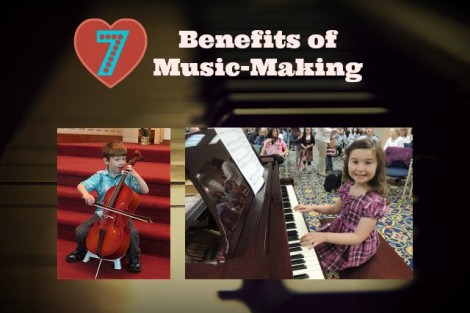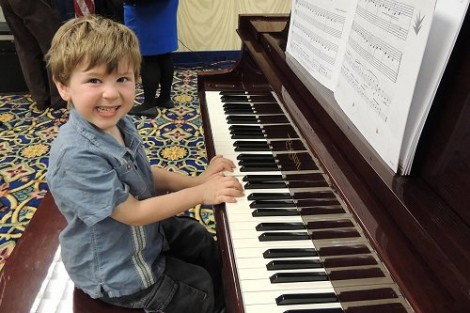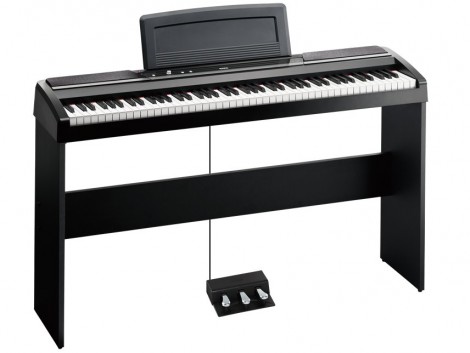
Even as a little baby, my son responded to different tunes and rhythms. If he cried, I would just tap out a syncopated rhythm and the change up would grab his attention.
By age two he was singing along in the car and demanding we “name that tune” as he hummed.
Music was a big part of my childhood, too. My Fantasia soundtrack played on on a loop for so long as I danced around that the grooves on the vinyl wore out. My grandfather, a professional pianist, was my first music teacher–showing me how to pick out the notes that would blend together. As a teen, I “discovered” my parents’ classic rock albums and a whole new identity for myself. More than anything else, it is the soundtrack that defines my memories.
I knew that I wanted to give my children the gift of music, too–for their intellectual and cultural growth, yes, but also because music delights the mind and feeds the soul. The popular press has seized on the brain-boosting powers of listening to music but to really get the full effect of mind-expanding joy, self-expression, and social harmony, you have to make music.
Learning to play an instrument:
- Provides a creative outlet. Children will be able to express themselves through music.
- Stimulates neural connections. Reading music is like speaking another language and has similar benefits.
- Boosts mathematical thinking. Performing music requires an awareness of rhythm and intervals. Children will effortlessly learn the mathematical concepts of counting, fractions, patterns, and more.
- Promotes “grit.” There are no shortcuts in mastering an instrument. Even the most talented musician must practice regularly and push through challenges.
- Encourages confidence. As children perfect a song and perform, they will gain an authentic sense of confidence and self-esteem.
- Helps social growth. Children who love music have an avenue into other perspectives, times in history, and culture. And playing music with or for others is a great way to meet people.
- Fills you with joy. This is subjective, of course, but I always feel like I am closer to the sublime when I play. My heart is filled with awe and gratitude at the beauty of creation.

So, we signed our children up for piano lessons when they expressed an interest. Piano is the perfect first instrument for young beginners. When you press the keys, the hammers strike the strings and produce effortless sound. Sure, it will take years and hours of practice to perfect, but the gratification of making a noise is immediate, unlike with most other instruments.
My eldest began piano at age 3. My son started at age 4 and after two years of playing earned a perfect score playing Shostakovich at a music festival. I love how playing music challenges and delights them.
Pianos are expensive instruments, however, and are notoriously difficult to move, making rentals impractical. In addition to the cost of the instrument, there are regular tunings.
Digital pianos make lessons more accessible for children. Just look at these digital pianos available from Korg. You can fit one in your living room even if you have a small apartment or a dorm room–no worries if your only spot is near a window or the radiator, either. With dual headphone inputs on many models, lessons and practice won’t wake the baby or disturb the neighbors. When kids start experimenting with composing, they can get a variety of instrument and other sounds on the keyboard. And, not only do you save money on the instrument, a digital piano never needs to be tuned.

We have an upright at home but I could definitely see sending my kids to college with a digital piano so they can practice in their rooms. If you have been thinking about getting a piano but are hesitating because of the cost, space, and upkeep, a digital piano is a great option.
Disclosure: This post is part of a sponsored campaign from Korg and the Quality Blue Community. As always, all words and opinions are my own. Original photo background by Pawel Maryonov.
